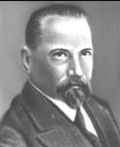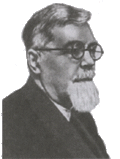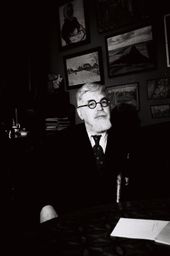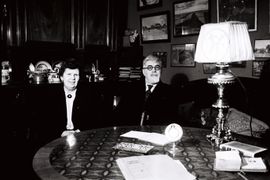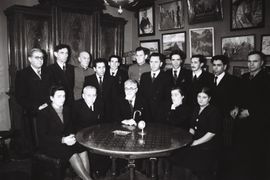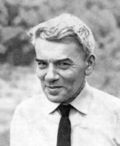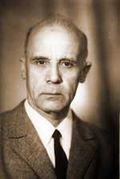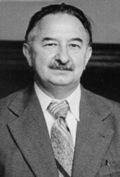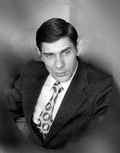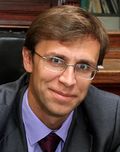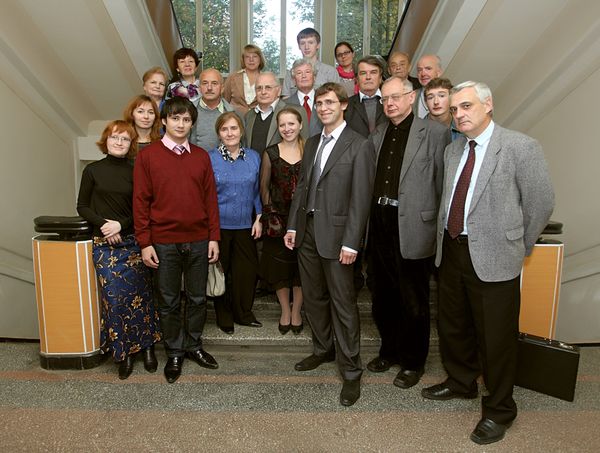Difference between revisions of "History"
| (3 intermediate revisions by one other user not shown) | |||
| Line 1: | Line 1: | ||
| + | [[ru:История кафедры "Теоретическая механика"]] | ||
<!--<StatisticYaGoog/>--> | <!--<StatisticYaGoog/>--> | ||
| + | |||
| + | =='''Ivan Vsevolodovich Meshcherskiy'''== | ||
| + | [[File:Mesherskij2.jpg|120px|left]] | ||
| + | [[File:Mesch.jpg|right|600px]] | ||
| + | It is no coincidence that at the opening of the St. Petersburg Polytechnic Institute, on October the 3rd, 1902, the first lecture to students of the technical faculties (metallurgic, electromechanical and shipbuilding) was read by Professor Ivan Vsevolodovich Meshcherskiy (1858-1935). | ||
| + | He had been a chairman of Theoretical Mechanics Department since the day of its establishment in 1902 up to 1930 and played a significant role in theoretical mechanics teaching not only in Russia, but all over the world. | ||
| + | Being one of the scientists who brought teaching mechanics in high technical schools closer to the needs of the engineering practice he, with all the Department staff, published «Theoretical Mechanics Problems» problem book and introduced practical trainings (exercises) for students. | ||
| + | The first printed issue of the problem book was published in 1914, the last one, the 37th, in 1998. On January the 15th, 1893, at a St.Petersburg Mathematical Society meeting, he read the paper called «Dynamics of variable-mass body» that greatly promoted development of native rocket industry. | ||
| + | Ivan Vsevolodovitch had a broad area of interests, it can be seen from the titles of his articles: «Hydrodynamic analogy of rolling», «A variable-mass dynamics problem», «Differential motion equations of gyroscopic monorail carriage», «Theoretical research of manometric tube», «Current state of the question about mechanical units», «B.K. Bobylev’s proceedings on hydrodynamics». | ||
| + | From 1907 to 1908 I.V. Meshcherskiy has been the principal of the St.Petersburg Polytechnic Institute. | ||
| + | |||
| + | |||
== '''Yevgeny Leopoldovich Nicolai''' == | == '''Yevgeny Leopoldovich Nicolai''' == | ||
[[File:Nikolai.gif|left|120px]] | [[File:Nikolai.gif|left|120px]] | ||
[[File:Nikolai.000014.JPG|170px|right]] | [[File:Nikolai.000014.JPG|170px|right]] | ||
[[File:Nikolai.000011.JPG|270px|right]] | [[File:Nikolai.000011.JPG|270px|right]] | ||
| − | + | [[File:Nikolai.000021.JPG|270px|right]] | |
Yevgeny Leopoldovich Nicolai, the honored worker of science and technology of the RSFSR (1880-1950) worked at the department since 1903. He headed the department from 1930 to 1936 and from 1944 to 1950. In 1916, Nicolai successfully defended his master’s thesis “On the problem of an elastic line with the double curvature”. After that, in June 1917, he was unanimously elected by Academic Senate of Petrograd Polytechnic University (presently named SPbSPU) as a professor at Department of Theoretical Mechanics. | Yevgeny Leopoldovich Nicolai, the honored worker of science and technology of the RSFSR (1880-1950) worked at the department since 1903. He headed the department from 1930 to 1936 and from 1944 to 1950. In 1916, Nicolai successfully defended his master’s thesis “On the problem of an elastic line with the double curvature”. After that, in June 1917, he was unanimously elected by Academic Senate of Petrograd Polytechnic University (presently named SPbSPU) as a professor at Department of Theoretical Mechanics. | ||
| Line 10: | Line 23: | ||
While working as a lecturer Professor Nicolai concluded that existing course “Theoretical Mechanics” should be revised. He developed new lecture courses for the departments where he worked (Polytechnic University, Technologic University, University of Railway Engineering). | While working as a lecturer Professor Nicolai concluded that existing course “Theoretical Mechanics” should be revised. He developed new lecture courses for the departments where he worked (Polytechnic University, Technologic University, University of Railway Engineering). | ||
On the base of the courses he compiled a fundamental textbook in two parts “Lectures on Theoretical Mechanics” (1922-1925). Soon this textbook became renowned in all the Russian technical universities and it opened a new era of teaching Mechanics. Until 1937 the first part of the textbook was reprinted for 11 times, and second – for 5 times. In the next years Nicolai published the third part, which included Euler-Lagrange equation and theory of small-amplitude oscillations. Finally, in 1939, the three parts of revised and updated textbook entitled “Theoretical Mechanics” was announced. Written with clarity and precision, this course provides the necessary knowledge to every engineer in theoretical mechanics and contains numerous illustrations of the laws of Mechanics. | On the base of the courses he compiled a fundamental textbook in two parts “Lectures on Theoretical Mechanics” (1922-1925). Soon this textbook became renowned in all the Russian technical universities and it opened a new era of teaching Mechanics. Until 1937 the first part of the textbook was reprinted for 11 times, and second – for 5 times. In the next years Nicolai published the third part, which included Euler-Lagrange equation and theory of small-amplitude oscillations. Finally, in 1939, the three parts of revised and updated textbook entitled “Theoretical Mechanics” was announced. Written with clarity and precision, this course provides the necessary knowledge to every engineer in theoretical mechanics and contains numerous illustrations of the laws of Mechanics. | ||
| + | |||
| + | The versatile scientific activity of E.L. Nikolai quite clearly traces the history of formation and development of the four research areas: | ||
| + | # the theory of elasticity, mainly the theory of deformation of thin rods and stability theory of rods; | ||
| + | # the vibration theory; | ||
| + | # the theory of gyroscopes and gyroscopic instruments; | ||
| + | # the history of mechanics. | ||
| + | |||
| + | In 1928, E.L. Nicolai read a report, entitled "The stability of the rectilinear equilibrium shape of the twisted rod” that he became renowned for`. | ||
| + | By this one and a number of his other works, E.L.Nikolai established himself as a recognized founder of a new scientific field, the theory of elastic stability of non-conservative systems. | ||
| + | E.L. Nikolai actively participated in the development of a new field of industry, the gyroscopic instrumentation. | ||
| + | Along with his research and teaching activities, Prof. E.L. Nikolai spent much time on the large scale organizational work: Vice-Rector for Academic Affairs (1920-1921), Dean of the Civil Engineering Faculty (1921-1923), Dean of the Physics and Mechanics Faculty (1930, 1937-1938). | ||
| + | At the Physical and Mechanical Institute (1930-1934) he was head of the department of technical mechanics and opened new specialty "Dynamic phenomena in machines and mechanisms", which now corresponds to "Dynamics and strength of machines" (Mechanics and Control Processes Department, MFF). | ||
| + | Eugeny Leopoldovich initiated publishing of "Applied Mathematics and Mechanics" journal in our country; he was managing editor of "Bulletin of Mechanics and Applied Mathematics" of Leningrad Mechanical society; in 1933 it became the all-Union journal "Applied Mathematics and Mechanics" and E.L. Nikolai continued to be its managing editor until 1936. | ||
| + | |||
| Line 40: | Line 67: | ||
<br style="clear: both" /> | <br style="clear: both" /> | ||
| − | ==Pavel Andreevich Zhilin== | + | =='''Pavel Andreevich Zhilin'''== |
[[File:Zhilin.jpg|120px|left]] | [[File:Zhilin.jpg|120px|left]] | ||
[[File:kafJ.jpg|600px|right]] | [[File:kafJ.jpg|600px|right]] | ||
| Line 48: | Line 75: | ||
<br style="clear: both" /> | <br style="clear: both" /> | ||
| − | ==Anton Miroslavovich Krivtsov== | + | =='''Anton Miroslavovich Krivtsov'''== |
[[File:Krivtsov_02.jpg|120px|left]] | [[File:Krivtsov_02.jpg|120px|left]] | ||
[[File:Kaf_TM.jpg|600px|right]] | [[File:Kaf_TM.jpg|600px|right]] | ||
Latest revision as of 19:10, 18 January 2017
Contents
Ivan Vsevolodovich Meshcherskiy[edit]
It is no coincidence that at the opening of the St. Petersburg Polytechnic Institute, on October the 3rd, 1902, the first lecture to students of the technical faculties (metallurgic, electromechanical and shipbuilding) was read by Professor Ivan Vsevolodovich Meshcherskiy (1858-1935). He had been a chairman of Theoretical Mechanics Department since the day of its establishment in 1902 up to 1930 and played a significant role in theoretical mechanics teaching not only in Russia, but all over the world. Being one of the scientists who brought teaching mechanics in high technical schools closer to the needs of the engineering practice he, with all the Department staff, published «Theoretical Mechanics Problems» problem book and introduced practical trainings (exercises) for students. The first printed issue of the problem book was published in 1914, the last one, the 37th, in 1998. On January the 15th, 1893, at a St.Petersburg Mathematical Society meeting, he read the paper called «Dynamics of variable-mass body» that greatly promoted development of native rocket industry. Ivan Vsevolodovitch had a broad area of interests, it can be seen from the titles of his articles: «Hydrodynamic analogy of rolling», «A variable-mass dynamics problem», «Differential motion equations of gyroscopic monorail carriage», «Theoretical research of manometric tube», «Current state of the question about mechanical units», «B.K. Bobylev’s proceedings on hydrodynamics». From 1907 to 1908 I.V. Meshcherskiy has been the principal of the St.Petersburg Polytechnic Institute.
Yevgeny Leopoldovich Nicolai[edit]
Yevgeny Leopoldovich Nicolai, the honored worker of science and technology of the RSFSR (1880-1950) worked at the department since 1903. He headed the department from 1930 to 1936 and from 1944 to 1950. In 1916, Nicolai successfully defended his master’s thesis “On the problem of an elastic line with the double curvature”. After that, in June 1917, he was unanimously elected by Academic Senate of Petrograd Polytechnic University (presently named SPbSPU) as a professor at Department of Theoretical Mechanics. Professor Nicolai delivered lectures on theoretical mechanics and special courses on theory of elasticity, fluid mechanics, and machine dynamics at the Mechanical, Chemical and Industrial-Agricultural departments. While working as a lecturer Professor Nicolai concluded that existing course “Theoretical Mechanics” should be revised. He developed new lecture courses for the departments where he worked (Polytechnic University, Technologic University, University of Railway Engineering). On the base of the courses he compiled a fundamental textbook in two parts “Lectures on Theoretical Mechanics” (1922-1925). Soon this textbook became renowned in all the Russian technical universities and it opened a new era of teaching Mechanics. Until 1937 the first part of the textbook was reprinted for 11 times, and second – for 5 times. In the next years Nicolai published the third part, which included Euler-Lagrange equation and theory of small-amplitude oscillations. Finally, in 1939, the three parts of revised and updated textbook entitled “Theoretical Mechanics” was announced. Written with clarity and precision, this course provides the necessary knowledge to every engineer in theoretical mechanics and contains numerous illustrations of the laws of Mechanics.
The versatile scientific activity of E.L. Nikolai quite clearly traces the history of formation and development of the four research areas:
- the theory of elasticity, mainly the theory of deformation of thin rods and stability theory of rods;
- the vibration theory;
- the theory of gyroscopes and gyroscopic instruments;
- the history of mechanics.
In 1928, E.L. Nicolai read a report, entitled "The stability of the rectilinear equilibrium shape of the twisted rod” that he became renowned for`. By this one and a number of his other works, E.L.Nikolai established himself as a recognized founder of a new scientific field, the theory of elastic stability of non-conservative systems. E.L. Nikolai actively participated in the development of a new field of industry, the gyroscopic instrumentation. Along with his research and teaching activities, Prof. E.L. Nikolai spent much time on the large scale organizational work: Vice-Rector for Academic Affairs (1920-1921), Dean of the Civil Engineering Faculty (1921-1923), Dean of the Physics and Mechanics Faculty (1930, 1937-1938). At the Physical and Mechanical Institute (1930-1934) he was head of the department of technical mechanics and opened new specialty "Dynamic phenomena in machines and mechanisms", which now corresponds to "Dynamics and strength of machines" (Mechanics and Control Processes Department, MFF). Eugeny Leopoldovich initiated publishing of "Applied Mathematics and Mechanics" journal in our country; he was managing editor of "Bulletin of Mechanics and Applied Mathematics" of Leningrad Mechanical society; in 1933 it became the all-Union journal "Applied Mathematics and Mechanics" and E.L. Nikolai continued to be its managing editor until 1936.
Anatoly Isaakovich Lurie[edit]
Anatoly Isaakovich Lurie, corresponding member of the USSR Academy of Sciences (1901-1980) headed the department from 1936 to 1944. He is the author (with L.G. Loitsiansky) of the widely known ”Theoretical Mechanics” textbook (1932), the latest edition of which was published in 1986. In this textbook, the classical mechanics was explicated using the vector analysis for the first time in Russia. Numerous tasks, which had not only illustrative, but also practical significance, was an important part of the textbook. Lurie is the author of eight books, including the fundamental monographs of an encyclopedic character: ”Analytical Mechanics” (1961), ”Theory of elasticity” (1970), ”Non-linear theory of elasticity” (1980). One can read more about Lurie’s miscellaneous scientific research in his ‘memoirs’ on “Mechanics and control processes” department, which he headed from 1944 to 1976.
Georgy Nikolaevich Nikolsky[edit]
Professor Georgy Nikolaevich Nikolsky headed the department from 1950 to 1954. He was a prominent expert in the field of automatic control processes and one of the authors of the first in the USSR unmanned aircraft system.
Nikolai Nikolaevich Polyakhov[edit]
Professor Nikolai Polyakhov (1906-1987), honored Worker of Science and Technology of the RSFSR, headed the department from 1954 to 1955. He is the author of the well-known works on fluid mechanics and ”Theoretical Mechanics” textbook for the universities (in collaboration with S.A. Zegzhda and M.P. Yushkov).
Georgy lustinovich Janelidze[edit]
Professor Georgy lustinovich Janelidze (1916-1964) headed the department from 1955 to 1964. His textbook ”Theoretical Mechanics in examples and problems”, written in collaboration with the department members M.I. Bat’ and A.S. Kelzon, became popular among Russian students. G.I. Janelidze was a dean of the Faculty of Physics and Mechanics from 1956 to 1964. He is an author of the well-known works on the general mechanics, mathematics, physics, medicine, theory of elasticity and plasticity, theory of naturally twisted rods. He wrote such monographs as, for example, “Statics of thin-walled rods” (1948, published in collaboration with Ya.G. Panovko) and “Vibratory displacement” (1964, with I.I.Blekhman). In his last monograph he had discovered new effects adopting the methods of the nonlinear theory of oscillations. The discovery has made possible the effective granular media transport. The transport process is carried out through an excitation of particles’ transverse oscillations.
Vadim Konstantinovich Prokopov[edit]
Professor Vadim Konstantinovich Prokopov (1920-1998) was the head of the department from 1964 to 1989. He is an author of more than 50 scholarly publications. One of his undoubted achievements was the solution of the important three-dimensional problems of elasticity and convergence proof of the Papkovich method. V.K. Prokopov was the member of the Research and Methodology Committee on Theoretical Mechanics under the Ministry of Higher Education Institutions USSR and the member of the Head Committee on Mechanics under the Ministry of Higher Education Institutions USSR.
Pavel Andreevich Zhilin[edit]
Professor Pavel Andreevich Zhilin (1942-2005) was the head of the department from 1989 to 2005. He was the member of Russian National Theoretical and Applied Mechanics Committee, the member of Presidium of the “Applied Mechanics” Research and Methodology Committee and member of the Research and Methodology Committee on Theoretical Mechanics under the Ministry of General and Professional Education of Russia. P.A.Zhilin was an academician of Saint-Petersburg Academy of Science on Strength Problems (SPAS). He published more than 150 scientific and methodological works. One of his main research directions was the extension of the methods of Rational Mechanics to non-mechanical fields such as Micro-physics and Electrodynamics.
His main results are the following: development of the general theory of the elastic shells, without using static and kinematic hypothesis; general formulation of the fundamental laws of dynamics, applicable in the non-mechanical fields; development of the group theory for non-Euclidean tensors; introduction of a new solid body oscillator necessary for the multi-polar media development; establishing a theorem on the representation of the rotation groups, engaging the known findings on the subject; development of the modified electrodynamics equations describing not only transversal, but also longitudinal waves; derivation of the dynamic equations for the Kelvin media. This equation gives a strict mechanical interpretation of the Schrödinger and Klein-Gordon equations.
Anton Miroslavovich Krivtsov[edit]
Professor Anton Miroslavovich Krivtsov is the head of the department since 2005. He is the member of Russian National Theoretical and Applied Mechanics Committee and the head of “Laboratory for Discrete Models in Mechanics” IPME RAS since 2012. A.M. Krivtsov is also a scientific supervisor of Center for scientific and technical creativity of the youth (SCY) SPbPU. A.M. Krivtsov was made a professor of RAS in 2015. His research interests lay in the different fields of Mechanics, Physics and mathematical modeling: dynamics of the rigid body; continuum mechanics; theory of the microstructured media; nanomechanics; theory of vibration processing of materials; astrophysics. The main direction of A.M. Krivtsov’s science work is the mathematical and computational modeling of the microstructured media based on the molecular dynamics and the particle dynamics methods.
A.M. Kivtsov contributed to the development of the particle dynamics method. His contribution allowed to discover new effects that were difficult to describe by the means of continuum mechanics because of the discontinuities, arising in the case of large non-elastic deformation and fracture. The particle dynamics method allows to investigate such processes with regard to the internal structure of the media or model a system at the micro- or nanoscale level.
